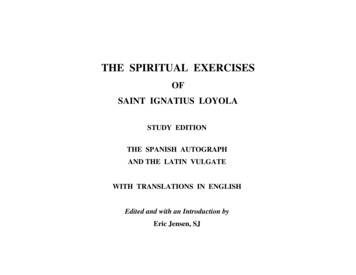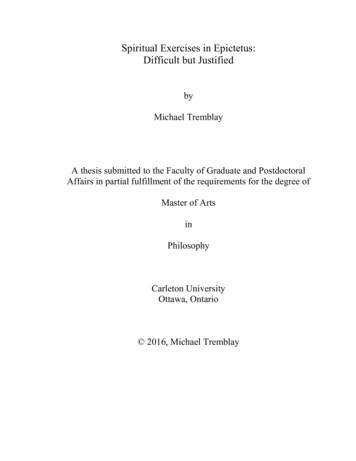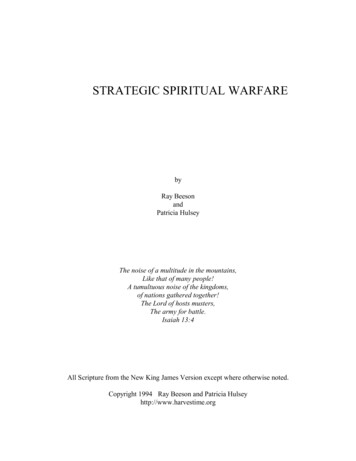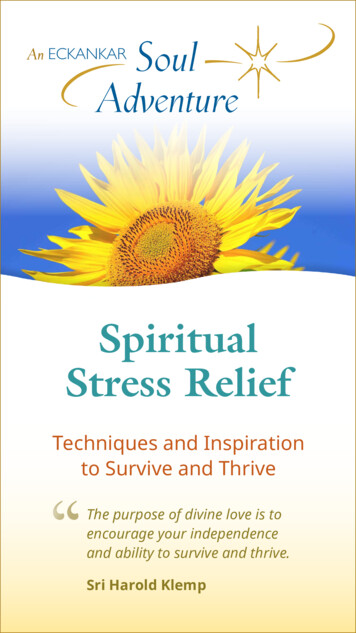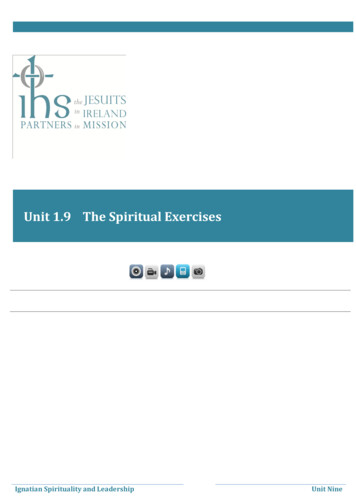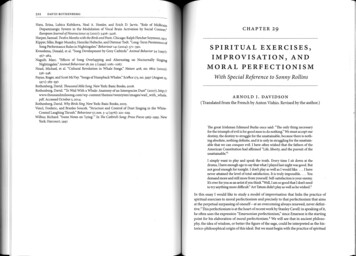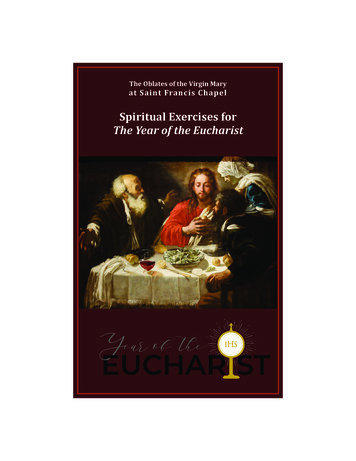
Transcription
The Oblates of the Virgin Maryat Saint Francis ChapelSpiritual Exercises forThe Year of the Eucharist
Spiritual Exercises forThe Year of the EucharistSt. Francis Chapel—Bostonstaffed byThe Oblates of the Virgin Mary2
Copyright informationScripture texts in this work are taken from the New American Bible, revised edition 2010, 1991, 1986, 1970 Confraternity of Christian Doctrine, Washington, D.C. and are usedby permission of the copyright owner. All Rights Reserved.No part of the New American Bible may be reproduced inany form without permission in writing from the copyrightowner.Nihil Obstat: Rev. Michael Zimmerman, S.T.L.Permission: Seán P. Cardinal O’Malley, O.F.M Cap.Archbishop of BostonDate: June 12, 20203
Contents1. Prayer of Preparation for Eucharistic Adoration62. Introduction73. Foundational Week: From Sacrament to Reality114. Week I:AbrahamTo See as God Sees155. Week II:St. PaulGod Sees Me in Mercy196. Week III:The Man Born BlindI Am!227. Week IV:Peter or JudasTo Whom Shall We Go?258. Week V:RuthBeing in Communion289. Week VI:St. Mary of BethanyPatient Love3110. Week VII:St. JosephSilent Devotion3411. Week VIII:Our LadyReciprocal Love3712. Week IX:St. JohnLiving the Eucharist4013. Eucharistic Amazement434
Not as man sees does God see,because man sees the appearancebut the LORD looks into the heart.1 Samuel 16:75
Prayer for Preparation for Eucharistic AdorationBy Venerable Bruno LanteriO my gracious God, make my act of adoration pleasing to you. Thismarvelous and simple act, as I give you all that I am and unite myselfto all that you are. Oh Jesus! I am at your feet; let me find you in myprayer. Oh Jesus! Speak to my heart that I may abandon myself andmy concerns to you. May I give all of myself to you; all my thoughts,all my feelings, my desires and all that is within me and without. Ileave all to you, oh Lord. Make of me what you will, oh my God. I giveto you my life, not only the life I live in exile on earth but also myhope for life in eternity. I leave you my salvation. I put my will inyour hands and give to you the power you gave to me over my actions. Make me according to your heart and create in me a pureheart, a docile and obedient heart. Strengthen my faith that I may runafter you and after your sweetness. Oh my God, make my heart rightthat I may love you with all of it, with that heart which you form inme by your grace. May I surrender everything to you and havenothing left but myself, so that I may surrender that too, the one gift Iknow you desire. Amen.Venerable Bruno Lanteri(1759-1830)Founder of the Oblates of the Virgin Mary6
IntroductionAfter the sabbath, as the first day of the week was dawning, MaryMagdalene and the other Mary came to see the tomb. And behold, therewas a great earthquake; for an angel of the Lord descended fromheaven, approached, rolled back the stone, and sat upon it. Hisappearance was like lightning and his clothing was white as snow. Theguards were shaken with fear of him and became like dead men. Thenthe angel said to the women in reply, “Do not be afraid! I know thatyou are seeking Jesus the crucified. He is not here, for he has beenraised just as he said. Come and see the place where he lay. Then goquickly and tell his disciples, ‘He has been raised from the dead, and heis going before you to Galilee; there you will see him.’ Behold, I havetold you.” Then they went away quickly from the tomb, fearful yetoverjoyed, and ran to announce* this to his disciples. And behold, Jesusmet them on their way and greeted them. They approached, embracedhis feet, and did him homage. Then Jesus said to them, “Do not beafraid. Go tell my brothers to go to Galilee, and there they will see me.”(Matthew 28:1-10)“Just as he said.” Before the resurrection happened as an historicalevent, Jesus announced it. The angel sent the women to announce theresurrection even before they had seen the risen Jesus with theirown eyes. Entering into the power of the resurrection is first andforemost an act of believing in what Jesus said and entrusting yourself to his promises. Then sight becomes possible. That is why in theGospel of John Jesus is recorded as saying, “Blessed are those whohave not seen and have believed” (John 20:29). Yet, as it was for St.Thomas the Apostle it is so for us, namely, that we struggle withdoubt. The struggle to come to greater trust in Christ is a noble one.One that requires a commitment to spiritual exercise.Jesus Christ has given himself to us as spiritual nourishment in theHoly Eucharist. His very life is given up for you and shared with youto be consumed and to become one with him, just as he said at theLast Supper.Faith is always an event of communion. No one comes to faith aloneand isolated. Faith is a gift that comes from God but is transmittedthrough a community. The Apostles did not come to knowledge of7
the resurrection through their own intuition. The women were sentto them and they shared their new faith. The Apostles then established Churches, communities of faith centered on the Eucharist,throughout the world. To receive faith is to receive the gift of communion with God and with others. It means to entrust oneself to thiscommunion and to give oneself to its growth and mission.The ExercisesThese spiritual exercises are meant to generate a deeper love, devotion and faith in the Holy Eucharist, the Blessed Sacrament. JesusChrist said, “My flesh is true food, my blood is true drink” (John6:55). The Church is built on this promise and celebrates it faithfullythroughout the ages, just as he said. The exercises are divided intoten weeks. That is the number of weeks between Holy Thursday andthe Solemnity of Corpus Christi, sixty-six days. There is a theme foreach week of exercises focused on a particular biblical figure andhow that theme relates to the Eucharist. With each theme there is agrace to ask the Lord for prior to each exercise. This grace to ask forshould be present with you throughout the week as it shapes yourencounters with the Lord. As you go through whole book of exercisesyou should find yourself asking for other graces as well.Each week of exercises include contemplations and meditations.These are to be understood within the Ignatian tradition of prayer.Contemplation means to use your God-given imagination to picturethe scenes of the scriptures assigned. Be as vivid as possible. See thewhole scene, including the place, the people, the sounds and the colors. Place yourself in the scene as well and be a particular character,or yourself. When you do this be sure to enter the scene as you trulyare, not as you think you should be, but according to how you reallyfeel. In this way, a contemplation is not a work of fiction; it is allowing the word of God to penetrate deeply into your heart. Contemplation is a work of the whole person: mind, heart and emotions. Someof the scriptures for contemplation are lengthy. This allows for thecontemplative exercises to be divided up over a couple of days. Theydo not have to be, nor should they be, completed in one sitting.A meditation is a work of the mind. We read carefully the scripturepassages and we ponder the meaning. What particular words,8
phrases or images attract you as you carefully read over thetext? Meditation primarily concerns thinking through the scriptureverses, but in its best form it often leads to very intimate conversation with God or simply resting in his love.Repetition & ColloquyA very important part of Ignatian spirituality is repetition. It meansto return to a particular exercise when it is fruitful to do so. If youpray over a particular passage of scripture and it brings you eithergreat consolation or desolation, that is, when there is significant spiritual movement within you, it probably calls for a repeat meditationon the same passage. At the end of each exercise you should prayerfully converse with any Person of the Holy Trinity, Our Lady or thesaint of the week. This colloquial prayer opens one to divine intimacy.JournalingAt the end of each exercise, contemplation or meditation, you shoulduse a journal to record what happened in the prayer. Do not do thiswhile the prayer is taking place. Wait till you are finished. Recordsuch things as what you reflected on. What was said? How did yourespond? What did it make you think or feel? Did you receive a special grace or a new challenge? To do this means you must reviewyour prayer. If the prayer did not seem to go well, explain to yourjournal why. You should write in your journal all that would describethe drama of your prayer. These journal entries are for you. Youshould re-read them as you continue through the whole ten weeks,noticing the trends that emerge from your time of prayer.For ConsiderationEach week contains a number of questions to help guide your meditations and contemplations. These questions for consideration assistin maintaining a spirit of recollection.9
Literary ExampleEach week of exercises also contain an example from a great work ofliterature. These literary examples help to illumine the theme of theweek. Coming to a deeper faith and love of the Eucharist is truly adrama. Part of the drama of life is our continuing transformation intothe likeness of Christ and our growing ability to become a living spiritual sacrifice to God. To live this Eucharistic life we need to be nurtured by a truly Catholic culture. Attempting growth in the spirituallife while concurrently being shaped by a worldly culture is impossible. The literary works mentioned in these exercises are meant toprovide a sample of how a Christian culture nurtures and protectsthe life of communion with God.Other Spiritual WorksAs a compliment to meditation and contemplation, the other traditional spiritual disciplines are recommended during these days. Fasting and alms giving are important means to aid prayer and to allowthe effects of prayer to be manifested in acts of love. Fasting doesn’tjust have to involve meat or foods. We should fast from the thingsthat have the greatest hold on us. That could be a cell phone or socialmedia or a particular hobby. While in a period of fasting utilize yourjournal to record the thoughts and emotions that arise within you.This will allow you to know what kind of hold these objects have onyou and how they forge a part of your identity as a Catholic.Spiritual exercises always require a spirit of generosity to the Lord.They also require an honesty in prayer. Be mindful of all yourthoughts and emotions and record them honestly. It is only throughthis type of honesty and generosity that a true transformation of theheart may take place.10
Foundation Week:From Sacrament to RealityHe advanced a little and fell to the ground and prayed that if it werepossible the hour might pass by him; he said, “Abba, Father, all thingsare possible to you. Take this cup away from me, but not what I will butwhat you will” (Mark 14:35-36).JesusAt the Last Supper he proclaimed the words and celebrated the supper. Later, he lived out the full implication and truth of what he saidand celebrated. In between he prayed and struggled within himselfto accept and take unto himself the full truth of what he said andwhat it meant.Jesus instituted the Eucharist at the LastSupper. He proclaimed that the breadand wine became his body and bloodshed and broken for the forgiveness ofour sins. The Last Supper and institutionof the Eucharist was the sacrament, theritual signs and words, of the reality thatJesus would live out to the full on thecross. Before he lived it out, he anticipated it, in sacramental form at the Supper.What Jesus did in the Garden of Gethsemane, in the time of his agony, was toprayerfully take into himself the meaningof the sacrament he celebrated at the Supper in order to live out thereality to the full on the cross on Good Friday.In the Garden the humanity of Jesus resisted the reality of the horrorof the cross, but he knew the Eucharist—the sacrament of his sacrifice— that he had proclaimed and celebrated at the Last Supper wasthe will of his Father and so in his agony he brought his humanity,and ours, into conformity with the Father’s will just as he had proclaimed at the Supper and prepared to fulfill his sacrificial mission.11
By our baptism we are empowered by the Holy Spirit to undertakewith Jesus the same task. Before we even fully experience and understand the reality of what it means to receive the body and blood ofChrist and to be in communion with God, we profess faith in the sacrament. First we speak the words; we say that we believe in the Eucharist before we even recognize the implications. On Holy Thursdaywe celebrate with sobriety the institution of the Eucharist and thepriesthood that makes it possible, and accompany the Lord to theGarden of Agony. On Corpus Christi, 66 days later, we celebrate withjoy the sacrament of the Body and Blood of Christ. Those 66 days—the in between time— is a time of appropriating, of taking unto oneself, the full truth of what we profess in faith and must live in charity.Living to the full the faith we profess in the Eucharist as communionwith the body and blood of Christ is not simply recalling a sacrificialdeath on the cross; much more, it is participating in the glory of theLord that shines forth on the face of Jesus Christ.Spiritual Exercises for the Foundational WeekFirst Exercise: Jesus at the Last SupperGrace to ask for: To profess a deep faith in the words of Jesus at theLast Supper, that his body and blood are given to us as food anddrink in the Eucharist.Contemplations:Meditation:Matthew 26:20-30John 6:52-59Second Exercise: Jesus in the Garden of GethsemaneGrace to ask for: To recognize any resistance to faith in the Eucharist within me and to accept the will of God concerning the BlessedSacrament.Contemplation:Meditation:Mark 14:32-42John 6:27-2912
Third Exercise: Jesus is Crucified and BuriedGrace to ask for: To experience the love of Jesus for me in securingmy redemption on the cross.Contemplation:Matthew 27:45-61Meditation:John 6:37-40For Consideration:1. What are the reactions and responses within you as you praythrough the words of Jesus concerning his body and blood?2. What does believing in Jesus really mean?3. Have you had your own Garden of Gethsemane moments in yourlife of making a commitment and struggling to follow-through?4. Can you see how the celebration of the Eucharist is a fulfillment ofthe statement of Jesus that he will not lose anything of what was given to him by the Father?Atticus FinchPerhaps the most read and well-known American novel in contemporary times is To Kill a Mockingbird. Atticus Finch is a lawyer in the1930’s in a town in Alabama and he must defend a black man whohas been accused of assaulting a white woman. In chapter 9 Atticusspeaks to his children, Jem and Scout, about the implications of taking the case of Tom Robinson. The children have been exposed toracist ridicule because of their father’s decision to accept the case.Atticus speaks to his children about the attacks that will be comingdue to his decision to defend Tom. Atticus’ brother Jack has come tovisit the family and he too engages in the conversations about thecase and all of the fury the family will face in the town. As Atticus explains to Jack how he came to take the case and how he really wanted13
to get through life without a case like this one, Jack responds to Atticus, “Let this cup pass from you, eh?” It is an allusion to Jesus in theGarden of Gethsemane. Atticus knows what he will face as a result ofaccepting the case. He has said yes, and will now accept upon himselfall that is to come, ultimately, he says, so that he can fulfill all righteousness.The Garden of Gethsemane is again alluded to when we see that theFirst Purchase African M.E. Church has cardboard fans that bear theimage of the Garden available for its members. Tom Robinson andthe whole black community of Maycomb must face the overt racismof the town and face it with courage. They know that Jesus has suffered for them and now he willsuffer in them.Atticus too was not simply accepting his fate. Fate is something external to us that we haveno control over. Atticus has chosen his destiny and he activelyand virtuously follows throughon his decision to defend Tom.This is what Jesus does in theGarden of Gethsemane. Jesus Christ is not ruled by fate. He is masterof his destiny with his Father and has chosen out of love to followthrough on the mission he embraced at the Last Supper. This is howthe Eucharist becomes a means to freedom for us too. As disciples ofChrist we are not victims to fate. To embrace the Eucharist is tochoose to remove oneself from the external forces of fate and to bemoved by the providence of God. Providence is not an external forcethat “pushes us around” like game pieces. Providence is a synergybetween God’s freedom and ours. In his freedom Jesus fully embraced the will of the Father and loved us to the end. In our devotionto the Eucharist we grow in our own freedom to do as Jesus hasdone. True freedom is not to be unbound by obligations; it is to embrace love at all moments and the binding to others that accompanies it. All of this power is contained in the Most Blessed Sacrament.14
Week I:To See as God SeesThen God said: Take your son Isaac, your only one, whom you love, andgo to the land of Moriah. There offer him up as a burnt offering on oneof the heights that I will point out to you (Genesis 22:2).AbrahamIt is perhaps one of the most terrifying scenes in the Bible. God commands Abraham to sacrifice his son Isaac. In chapter 1 of Genesis—in the beginning— we read of the magnificent, beautiful and goodloving God who creates the whole world from nothing. He loves hiscreation and he loves the human person most of all, making him inhis image and likeness. Later, in the book God calls Abram out fromhis society in Ur and promises to him many blessings and many descendants. After establishing a covenant with him, changing hisname to Abraham and providing him with a son in his old age, Godnow seems to move in an utterly stunning direction: He commandsAbraham to offer his son Isaac as a sacrifice. That is why it is calledthe testing of Abraham. Why would the omnipotent and loving Godtest Abraham in such a way? Why would God take Abraham from hissecure place in Ur to this new and terrifying place called Moriah anddemand ultimate sacrifice?The word Moriah is derived from the Hebrew word ra’ah, whichmeans “to see.” When God sends Abraham to the Land of Moriah heis sending him to a place where Abraham’s inner spiritual eye will beopened. What Abraham will learn to see is the truth about God andabout his own destiny. Returning to the first chapter of Genesis weread of the account of God’s creation. It says that after God createdlight he saw (ra’ah) that the light was good. God then creates theearth, the sea, the sun, moon, all creatures and finally mankind. Aftercreating these things it says that God saw that they were good. Finally, after all things were created on the sixth day it says that Godlooked at everything he created and found them to be very good.Seeing as God sees is not merely a matter of noticing. To see (ra’ah)15
as God sees is to have a deep experience of the truth of things, totaste them. God saw the good in the things he created. God especiallysees into the heart of a person and knows what is there. To see asGod sees is to experience within oneself the goodness of creation andto act in accord with that goodness. It is not merely possessingknowledge in the mind but experiencing deeply in one’s heart thatsomething is good, true and beautiful. This is why God called Abraham out of Ur and eventually to Moriah. He is not toying with Abraham, he is removing the stains of Ur from Abrahams’s eyes andteaching him to see as God sees. Through Abraham, God’s chosenpeople would be empowered to learn to see and experience theworld as God sees it. But the vision of God’s chosen people suffersfrom the effects of the Original Sin. To learn to see as God sees meansto surrender the things that we accumulate from the world that clutter our vision and block us from experiencing the gifts of God.Spiritual Exercises for Week IGrace to ask for: To know what I must let go of and entrust toGod, in order that I might see.Contemplations: Genesis 22:1-19Meditations: Genesis 12:1-6Romans 4:13-252 Corinthians 4:1-6For Consideration:1. In the Genesis 22 passage wherever it reads “provide” it can also be translated as “see.” Read that way, how does the meaningchange for you?2. If you were in Abraham’s place what would you be thinking andfeeling? What would you do? What must you surrender to God?3. Has God ever asked you for something big and difficult? Whatdid you do? How did it impact your spiritual life?16
4. Who does Paul in his Letter to the Romans say are the descendants of Abraham?Orual and PsycheThe great C.S. Lewis wrote many books but his purported favoritewas a novel Till We Have Faces. The story is based on the ancientGreek myth of Cupid and Psyche and is retold with a Christian vision.The two main characters are two sisters, Orual—who will succeedher father, the king, as queen—and Psyche, her very pure and innocent sister. At one point in the story the king is told by his priest thata pure sacrifice must be offered to the god of the Mountain in ordergain favor for the kingdom. Psyche, the purest person in the land, isoffered. She is taken to a place beyond the boundaries of the knownkingdom to the mountain of sacrifice. Orual, who hates the gods anddoes not believe in their goodness, travels to retrieve the body of herslain sister. When she arrives at the mountain she finds that Psycheis alive and well. She resides in the valley of the Mountain and invitesOrual to cross the river into the valley to see her new home. There,across the river, in the shadow of the Mountain, Orual and Psychetalk and it is clear that they see completely different things. Psycheclaims they are in a palace, that they are drinking wine and that sheis dressed in fine robes and that the weather is glorious. Orual believes Psych is either pretending or is completely mad, as all Orualcan see is water, not wine; rags, not robes; rain, not sun; and a darkand wet meadow, not a palace. Psyche realizes at one point thatOrual does not see any of the things that she sees. Orual is flush withanger and hate. Psyche is filled with love and delight. The two sisters,while standing in the same place, see utterly different realities andhave utterly different experiences.One sees beauty and riches, the other sees ugliness and poverty. Psyche lives in the vision of the god of the Mountain, while Orual stillsees things as someone from the other side of the river. Orual demands that Psyche let her see the god if it is all true but Psyche tellsher sister that you cannot demand to see the god, he must show himself when the time is right. Psyche tells Orual that only the god of theMountain is able to make her see, and that he will if she would lethim.17
The title of the novel bears its principle theme: in order to see wemust have faces. By faces, C.S. Lewis does not just mean the space atthe front of the head, but a virtuous and loving character that is ableto see things in a godly way. To have a face is to have a virtuous character. This is what is at the heart of God’s call to Abraham to offer hisson as a sacrifice. God is creating for Abraham a face so that he mightsee as God sees.18
Week II:God Sees Me in MercyI am Jesus, whom you are persecuting. Now get up and go into thecity and you will be told what you must do (Acts 9:5-6).St. PaulWhen the light of the world broke into the life of Saul of Tarsus itknocked him to the ground. All the knowledge he thought he had, theway he saw the world, began to be utterly transformed. Only throughJesus could he truly see. Only by trusting in the voice of Christ andallowing himself to be assisted by the community of believers couldPaul become a man able to see. It was not Paul’s knowledge of Godthat made him the great missionary saint. Paul himself would saythat what made him who he is, is that God sees him; that God knowshim. For the disciple of Christ the most important thing is to knowthat we are known and loved by God first, before we see him, orknow him or love him. The Lord is the one who initiates. We are always the ones who respond. When we are loving, when we are praying, when we are humbly serving, we are in that moment being lovedby God. It is his knowledge and love of us that makes us believers inhis Son and servants to one another.God’s love is creative. When he looks upon the sinner with love—wecall that kind of love mercy—he creates within that person the possibility of repentance. Paul knew that his repentance was not the fruitof his own goodness; rather, God’s love of him created within Paulthe moral and spiritual conversion that would make him the mostdynamic missionary in history. It was not until Paul looked up andsaw that Christ was looking at him that he could begin to fully live.All his life Saul of Tarsus had looked down at those who did not riseto his level of moral and spiritual purity. He thought that in his pharisaical zeal for the God of his fathers that he was serving the Lord. Only when he realized that Christ looked upon him in mercy could heknow his own blindness. With baptism into Christ, Paul finally beganto see. What he would see from that day forward was the work ofGod loving the world back into the holy embrace of his bosom.19
Spiritual Exercises for Week IIGrace to ask for: To know that God looks upon me with love andsustains me in life, especially through my reception of the Eucharist.Contemplations: Acts of the Apostles 9:1-22Meditations: 1 Corinthians 8:1-3Galatians 4:91 Corinthians 10:161 Corinthians 11:23-29For Consideration:1. What does Paul say is the sign that one is known by God?2. How does Ananias respond when God calls him? What is thesignificance of that response? How might you respond if you werehim?3. What is your impression about the way Ananias treated Saul?4. What does it mean to proclaim the death of the Lord? Why dowe proclaim his death in the Eucharist? What does it means toyou personally?20
Samwise GamgeeIn the great novel Lord of the Rings, two of the principle charactersfrom Middle Earth must traverse the dark land of Mordor to destroya magic ring that could enslave the whole world in darkness should itfall into the wrong hands. The two hobbits, Frodo and Sam, are exhausted and very close to either death or despair as they lay in thedark land struggling to continue on their journey. They traverseMordor seeking the volcano that alone is able to destroy the ring. Allalong their journey they must evade the attention of evil the eye ofSauron, the dark Lord of Mordor and the one who seeks the power ofthe ring. Sauron is literally a lidless eye that never closes or looks up.The eye only looks down or out but never up. Sauron cannot acceptanything above himself so he can never know beauty and truth, onlyoppression. As they continue to struggle along the way, Frodo andSam stop from exhaustion, desperately in need of sleep. The darkness of the night totally envelopes them as Frodo falls into sleep immediately. As Sam keeps himself awake, protecting his vulnerablemaster, Frodo, suddenly he is struck by the sight of beauty from astar twinkling in the night high above. In that moment Sam’s heart ispierced by the warmth of the glow of the star, and the knowledgethat the darkness ultimately cannot be victorious over beauty. Theevil eye can never know this because it cannot look up, but Sam discovers a new hope because he is able to look beyond himself. He isfinally able to overcome the fear and fall asleep under the beauty ofthe star.In the Eucharist, the love of Christ is actively at work to bring us intothe beauty that no darkness can ever touch. Receiving holy communion we are taken up and participate in that beauty that rises above allthings. By looking up to this beauty, we come to find a hope to continue the journey of faith. Gazing upon the Blessed Sacrament, wemust know that it is first, actually, God looking upon us with love thathas brought us to this place of union.21
Week III:I Am!Then Jesus said, I came into this world for judgment, so that those whodo not see might see, and those who do see might become blind(John 9:39).The Man Born BlindOne of the principle themes of John’s Gospel is how Jesus uses theDivine Name in reference to himself. In John 8:58 Jesus tells his audience that, “before Abraham was, I AM.” I AM refers to what God saidto Moses in Exodus chapter 3 at the burning bush. Moses asked whatGod’s name is and God responds, “my name is I AM.” Jesus declareshimself to be the Son of God by using the Divine Name. In chapter 9we encounter a man born blind. The Apostles identify him as either asinner or the son of sinners. All his life this man has heard again andagain how either he is a sinner or the son of sinners. That is how hehas come to know himself. That is the identity that his society gave tohim. Encountering Jesus, he is now able to see for himself the onewho will give him his true self. Still, after Jesus heals him, other people question whether it is truly the man they used to see begging.The man answers for himself and proclaims, “I am.” The man, whonow walks about freely and is able to look at others in the eyes, is notclaiming to be God. He is declaring his own dignity; the identity Jesushas given him. Prior to his encounter with Jesus, the man was a blindbeggar, thought to be a son of sinners, forgotten by most. Now he issomeone because he has trusted in Jesus and obeyed his voice.As the chapter continues we begin to understand just what it reallymeans “to see as God sees.” As was the case with Abraham, it is notsimply the ability to use one’s eyes,
Jun 12, 2020 · The Exercises These spiritual exercises are meant to generate a deeper love, devo-tion and faith in the Holy Eucharist, the Blessed Sacrament. Jesus Christ said, “My flesh is true food, my blood is true drink” (John 6:55). The Church is built on this promise and celeb





